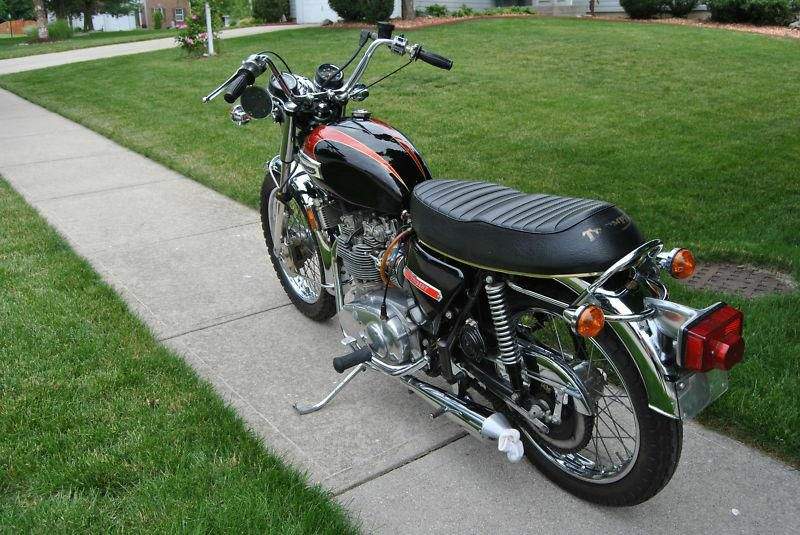
|
|
|
|
|
|
Classic Bikes
Custom Bikes
Individual
Racing Bikes AJP
AJS
Aprilia
Ariel
Avinton / Wakan
Bajaj
Benelli
Beta
Bimota
BMW
Brough Superior
BRP Cam-Am
BSA
Buell / EBR
Bultaco
Cagiva
Campagna
CCM
CF Moto
Combat Motors
Derbi
Deus
Ducati
Excelsior
GASGAS
Ghezzi Brian
Gilera
GIMA
Harley Davidson
Hero
Highland
Honda
Horex
Husaberg
Husqvarna
Hyosung
Indian
Jawa
Kawasaki
KTM
KYMCO
Laverda
Lazareth
Magni
Maico
Mash
Matchless
Mondial
Moto Guzzi
Moto Morini
MV Agusta
MZ / MuZ
NCR
Norton
NSU
Paton
Peugeot
Piaggio
Revival Cycles
Roland Sands
Royal Enfield
Sachs
Sherco
Sunbeam
Suzuki
SWM
SYM
Triumph
TVS
Ural
Velocette
Vespa
Victory
Vincent
VOR
Voxan
Vyrus
Walt Siegl
Walz
Wrenchmonkees
Wunderlich
XTR / Radical
Yamaha
Zero
Video
Technical
Complete Manufacturer List
|
Triumph Trident T150V 750
 The next major change came with the 1973 and 1974 T150V, with addition of a much-needed hydraulic front disk brake and the long-awaited 5-speed gearbox, which is what the "V" stands for in the model designation. Styling was cleaned up also, in keeping with the Bonneville line. The worker strike the closed the Meriden plant and crippled the company occurred early in 1974, cutting '74 Bonneville and TR7 to a trickle. But Tridents were built in BSA's Small Heath factory alongside their Rocket 3, so production went on unabated. Of course, by this time, Triumph had ceased to exist as a company, along with parent company BSA, replaced by the worker-owned Meriden Co-op who were strapped for cash from the very start. They often didn't have enough money to pay for the parts needed to finish a shipment of bikes, bikes didn't get shipped, orders didn't get filled, the money from those sales didn't come in, and the Co-op's situation worsened by the day. So, even though they were free to build Tridents at Small Heath, unfettered by the worker lockdown, they had neither the money to build them nor the customers to sell them to. Source: Classis British Motorcycles
|
|
|
Any corrections or more information on these motorcycles will be kindly appreciated. |